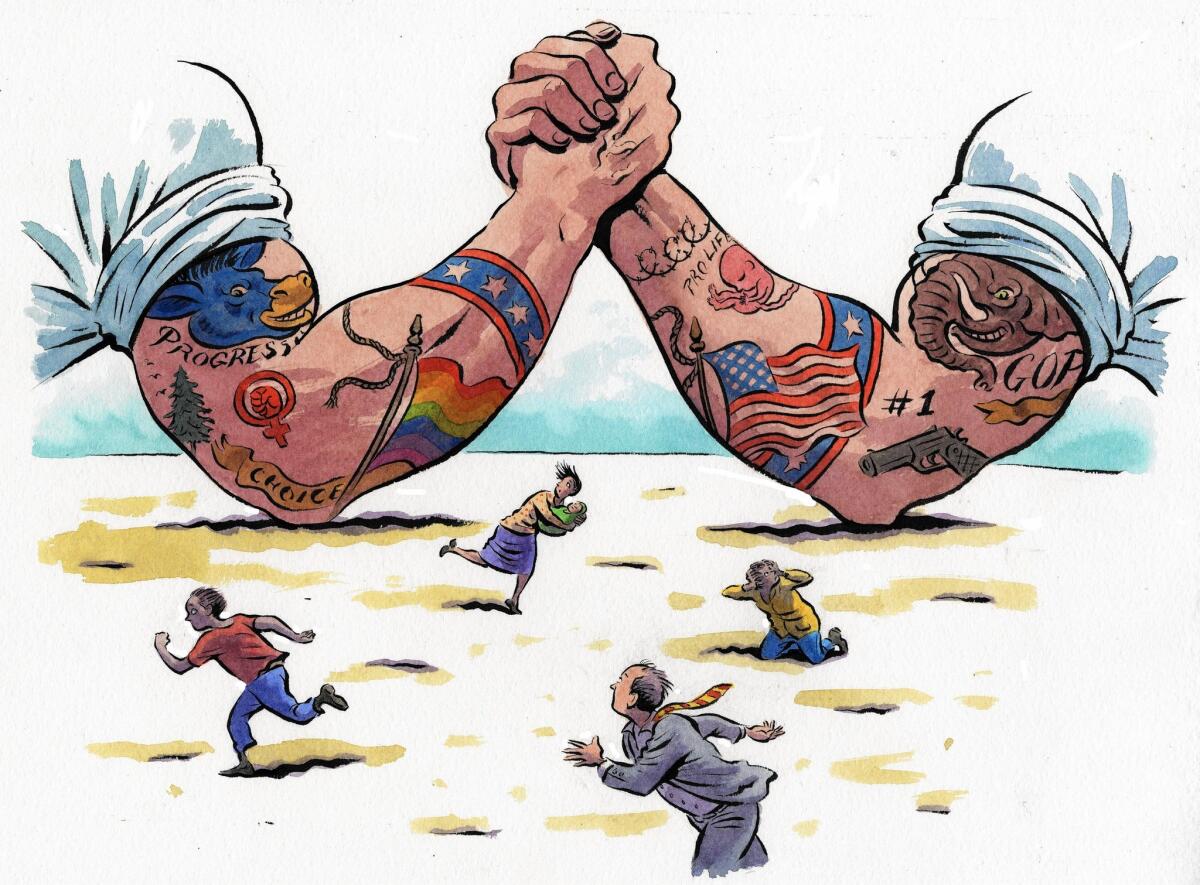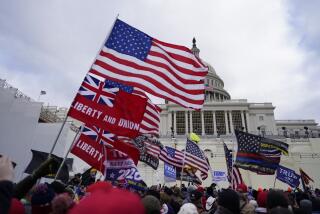Op-Ed: Why liberals win culture wars and conservatives win elections

Republican malcontents — and front-runners — Donald Trump, Ted Cruz and Marco Rubio have their differences but each is a bona fide culture warrior, eager to fight “them” in the name of “us.” Cruz, who refers to his campaign as an “awakening” in “the body of Christ,” blasts same-sex marriage as “an unrelenting assault” on biblical matrimony. Rubio opposes abortion, and he won’t go on the record for exceptions in cases of rape and incest. Trump allays the fears and anxieties of many by promising to wall off the nation from Mexicans and Muslims.
You may think such hostility is a modern phenomenon, unveiled in Pat Buchanan’s 1992 Republican National Convention speech declaring “a cultural war” for “ the soul of America.” “My friends, this election is about much more than who gets what,” Buchanan said. “It is about who we are.”
Two surprising conclusions emerge when America’s culture wars [are] weighed together. Conservatives typically start the battles, and liberals almost always win them.
But we misunderstand our culture wars if we see them as current events. Americans have been denouncing one another as blasphemers and traitors, false patriots and civic menaces, from the beginning of the republic.
Elections have long been bloody battlefields. No matter how far this year’s campaign sinks into culture-war vitriol, the election of 1800, which pitted Federalist John Adams against Democratic-Republican Thomas Jefferson, is likely to retain the U.S. record for viciousness. It served up “family values” and religious indignation with all the nastiness of the Crusades and all the urgency of the Apocalypse.
Adams’ surrogate Alexander Hamilton spoke of saving America from the “fangs of Jefferson” while Jefferson’s followers spoke of saving it from the “talons of Monarchists.” Adams was attacked as a “hideous hermaphroditical character”; Jefferson was sullied with rumors of sexual infidelity.
But this culture war homed in on Jefferson’s theological transgressions. Hamilton called him an atheist. As if anticipating current whisperings about President Obama, the Connecticut Courant suggested Jefferson might be a secret Jew or Muslim. A Federalist minister, convinced that Jefferson’s heresies disqualified him for the presidency, wrote that a vote for this “manifest enemy to the religion of Christ” would cause God to call down his wrath upon the nation.
After an electoral college tie and much drama in the House of Representatives, Jefferson was finally elected. In his inaugural address, he famously tried to unite his not-so-indivisible nation. “We are all Republicans, we are all Federalists,” he said.
But culture wars persisted. In the 19th century, the targets were Catholics and Mormons, with arguments that echoed one another. According to Protestant traditionalists, both of these groups practiced fake Christianity. Each harbored sexual deviants, who were driven by celibacy (Catholics) or polygamy (Mormons) to the grossest forms of immorality. And each presented a grave challenge to American democracy, by forcing adherents to vote in lockstep with the pope or their husbands.
In the 1920s and 1930s the battle over Prohibition and repeal was never confined merely to “drys” and “wets.” This conflict, too, involved Protestants aghast about Catholics — this time Irish saloonkeepers and German brewers from Pabst to Schlitz to Miller. More broadly, Prohibition pitted a largely monocultural right anxious about the blooming, buzzing confusion of modern life against a multicultural left committed to liberty in religion, dancing, dress and drinking.
Two surprising conclusions emerge when America’s culture wars — from Jefferson’s heresies to same-sex marriage — are stacked up and weighed together. Conservatives typically start the battles, and liberals almost always win them.
Conservatism is often said to be rooted in a commitment to states’ rights, free markets and limited government. But American conservatives have been for and against all these things at various times. The more consistent idea behind American conservatism is cultural: a form of life is passing away and it is worth fighting to revive and restore it. Driven by this narrative of loss and restoration, culture warriors struggle to resurrect the patriarchal family or Christian America or the homogeneous hometown.
Winning a battle doesn’t make a culture warrior righteous; losing does.
Conservatives typically lose these battles because the causes they select are lost from the start. For example, culture warriors took on Catholics when the Catholic population was mainstreaming and gaining power. They took on same-sex marriage when many gays and lesbians were already out of the closet and accepted by their heterosexual relatives, co-workers and neighbors.
Southern historian Charles Reagan Wilson wrote about the “Religion of the Lost Cause” embraced by Southerners after the Civil War. According to this gospel, the Confederate dead were martyrs in a righteous cause, not losers in the war against slavery. Even now, winning a battle doesn’t make a culture warrior righteous; losing does. Each defeat proves that America is in fact going to hell and is desperately in need of a defender.
This is one reason why Republicans often win elections today even as they campaign on lost causes. There is no way Mexicans are going to pay to build a border wall with T-R-U-M-P emblazoned upon it. And banning Muslims from the country is obviously a lost cause. But victory on these questions is not exactly the point of our current culture wars. The point is to win power electorally by losing culturally.
Investigating America’s many culture wars can be depressing. The United States is supposed to be “a nation of immigrants” with competing religious beliefs and political ideas. It is supposed to be a “symphony of civilization,” as the cultural pluralist Horace Kallen wrote in 1915. But all too often that symphony is shrill and off-key.
At least individual cultural battles do come to an end. Usually the conflict produces some consensus. And the consensus produces a more inclusive nation. You don’t need “New York values” these days to welcome Catholics or Mormons into the American family. American values will do the trick. It is not altogether naïve to hope that today’s tumult over who we are will soon die down, leaving Muslims and Latinos as American as can be.
Stephen Prothero is a religion professor at Boston University and the author of “Why Liberals Win the Culture Wars (Even When They Lose Elections).”
Follow the Opinion section on Twitter @latimesopinion and Facebook
More to Read
A cure for the common opinion
Get thought-provoking perspectives with our weekly newsletter.
You may occasionally receive promotional content from the Los Angeles Times.






